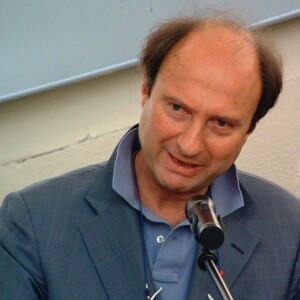Talks On Psychoanalysis
subjectivation
Episodes

Tuesday Jul 22, 2025
Tuesday Jul 22, 2025
In the wake of profound cultural change, the traditional image of the father has been destabilized, prompting renewed psychoanalytic reflection. No longer confined to authority alone, the paternal figure is now expected to embody both care and limit. What psychic space does the father occupy in the life of the child? In this episode, Heribert Blass explores fatherhood through a contemporary psychoanalytic lens.
Drawing on clinical experience, interdisciplinary research, and cultural observation, he outlines a model of committed paternity that integrates emotional presence with symbolic function. From early play to Oedipal conflict, the father's task is to protect, to differentiate, and to support the child's path toward autonomy. Rather than fading, he emerges as a complex figure situated at the intersection of intimacy, separation, and symbolic function—and essential to the child's inner world.
Heribert Blass, medical doctor, is a psychoanalyst for adults, children, and adolescents; a training and supervising analyst of the German Psychoanalytic Association and the IPA; also a specialist in psychosomatic medicine and psychotherapy, and psychiatry, working in private practice in Düsseldorf, Germany. He is the president-elect of the IPA and served as president of the European Psychoanalytic Federation from 2020 to 2024. His publications cover a wide range of topics, including male identity and sexuality, the image of the father, supervision, generativity both in clinical work and within psychoanalytic institutions, boundary violations, the relationship between internal and external reality, psychoanalysis and society (especially during the COVID-19 pandemic), as well as time and the experience of time.
French
German
Italian
Portoguese
Spanish
You can download a copy of the paper here
This Podcast Series, published by the International Psychoanalytical Association, is part of the activities of the IPA Communication Committee and is produced by the IPA Podcast Editorial Team.
Co-Editors: Gaetano Pellegrini and Nicolle Zapien.
Editing and Post-Production: Massimiliano Guerrieri.
To stay informed about the latest podcast releases, please sign up today.

Monday Jan 22, 2024
Monday Jan 22, 2024
What does a psychoanalyst do in his practice with his patients? How can we define the act of the psychoanalyst at work? It is this vast question that Bernard Penot addresses in this podcast, talking about the act of the psychoanalyst in the service of subjectivation. Referring to Freud's work on transference and then to Lacan's work on the psychoanalytical act during the years of student revolts in France in may 1968, he manages to show us the active involvement of the psychoanalyst in the practice of the cures he provides.
Bernard Penot is a french psychoanalyst. He lives and works in Paris. He has been a full member and training analyst of the Paris Psychoanalytical Society since 1990. As neuropsychiatrist, he was the director of a day hospital for adolescents in Paris for many years. He is the author of several books published in french, and of numerous articles published in the French journal of psychoanalysis and the International journal of psychoanalysis.
Link to the paper https://docs.google.com/document/d/1YtXzBF8rEX4-Gpf6tGsajv6-tShQxbwT/edit?usp=sharing&ouid=112457875385152358388&rtpof=true&sd=true
This episode is available also in French
A subtitled version of this podcast is available on our YouTube channel:https://youtube.com/playlist?list=PLhxiwE76e0QaOquX3GujdwNLFsgxUQNXz&si=yf381EDu3pess6Yz
This episode has been produced in collaboration with Julia-Flore Alibert.
This Podcast Series, published by the International Psychoanalytical Association, is part of the activities of the IPA Communication Committee and is produced by the IPA Podcast Editorial Team.
Head of the Podcast Editorial Team: Gaetano Pellegrini.Editing and Post-Production: Massimiliano Guerrieri.
Music: Chopin_Waltzes_Op.69. Performer Olga Gurevich. https://musopen.org/music/4415-waltzes-op-69/
Cover Image: Blue human figure and fox in cage on black paper. Blum, Alexandra, artist - Courtesy Library of Congress. https://hdl.loc.gov/loc.pnp/pp.print

Thursday Oct 12, 2023
Thursday Oct 12, 2023
A plea for a third topicality.An intrapsychic representation of the intersubjective bond,even before the discovery of the object.
Can psychoanalysis be useful with infants? How can we think through concepts of metapsychology with infants? The two Freudian topics are in reference to the instances which are fruit of the completed intrapsychic differentiation process. How can they be useful with infants, who by nature are still undifferentiated and unfinished? In this episode Bernard Golse presents us with his arguments for a third topical approach. Drawing on his extensive experience of parent-infant therapy, he proposes a metapsychology of the primitive pre-object bond, a perinatal topic of mental representation of the intersubjective bond prior to differentiation of instances and object discovery.
Bernard Golse is a child psychiatrist and psychoanalyst (member of the Association Psychanalytiquede France) and Professor Emeritus of Child and Adolescent Psychiatry at the Université Paris Cité. For many years he was head of the Child Psychiatry Department at the Necker-Enfants MaladesHospital in Paris. Among other associative activities, he is presently chair of the European Association of Child and Adolescent Psychopathology and he recently founded the Institut Contemporain de l'Enfance to promote psychological care and support for infants, children, and adolescents, with reference to psychoanalysis, psychopathology and pedagogy with links to the world of arts and culture because of the dialectic that exists between therapeutic creativity and artistic creativity. The three areas in which he has been most involved are early infant development, autism spectrum disorders and adoption issues. He is therefore particularly focused on the question of links.
A subtitled version of this podcast is available on our YouTube channel:https://youtube.com/playlist?list=PLhxiwE76e0QaOquX3GujdwNLFsgxUQNXz&si=yf381EDu3pess6Yz
This episode has been produced in collaboration with Julia-Flore Alibert.
This Podcast Series, published by the International Psychoanalytical Association, is part of the activities of the IPA Communication Committee and is produced by the IPA Podcast Editorial Team.
Head of the Podcast Editorial Team: Gaetano Pellegrini.Editing and Post-Production: Massimiliano Guerrieri.
You can download the written text of this paper from this link:https://docs.google.com/document/d/12dvhD8riz2DSwqYN7a8qOmbIQYndYUyF/edit?usp=drive_link&ouid=112457875385152358388&rtpof=true&sd=true
This episode is available also in French
Recommended Links and Readings:
S. Missonnier and B. Golse, The third topography: a topography of the bond, 89-114. In : Autistic phenomena and unrepresented states – Explorations in the emergence of Self (edited by H.B. LEVINE and J.SANTAMARIA).
Phenix Publishing House Ltd, “Firing the mind”, A.Santamaria Picoanálisis México, Oxfordshire, 2023

Friday Dec 16, 2022
Friday Dec 16, 2022
For those interested in the extensive written version on which this short talk is based, please contact the author at jfartaloytia@gmail.com .
From the Freudian conception of psychic bisexuality to the current approaches of transgenderism, the question of gender has knocked at the door of psychoanalysis to account for its articulation in the social context of its time. The different ways that people position themselves in life, confronts us with the challenge of thinking psychoanalytically about gender today.
Thus, this episode is entitled “Why and what is gender for?”.
Juan Francisco Artaloytia takes up this question. He talks about how and why gender emerged in the history of language and the species, and to what extent gender is still as important as it was in its origins.
Link to the paper https://docs.google.com/document/d/1QTbz_6lIbJRrl4N4QBwRwSAWZoP7vlgG/edit?usp=share_link&ouid=112457875385152358388&rtpof=true&sd=true
Juan Francisco Artaloytia holds a PhD, is a medical doctor, a psychiatrist and training Psychoanalyst of the Psychoanalytic Association of Madrid. He has been Secretary and Editor in Chief of the Journal of Psychoanalysis of the APM. He is currently Representative for Europe on the Board of the International Psychoanalytic Association. He has published articles and given lectures in national and international media. Freudian metapsychology is his field of reference, and topics of his special interests are psychosis, psychoanalytic training, and issues such as homosexuality and transsexuality. He has just published the book "Una metapsicología freudiana para el siglo XXI" (A Freudian metapsychology for the twenty-first century), which is a recapitulation of his work over the last 15 years.
this episode is available also in Spanish
This Podcast Series, published by the International Psychoanalytical Association, is part of the activities of the IPA Communication Committee and is produced by the IPA Podcast Editorial Team. Head of the Podcast Editorial Team is Gaetano Pellegrini. This episode was produced in collaboration with Ana Maria Martin Solar.
Editing and Post-Production: Massimiliano Guerrieri.

Wednesday Oct 26, 2022
Wednesday Oct 26, 2022
The paternal function is one of the most embedded concepts both in the singular dimension of clinical thinking and in the extended of social functioning. It underlies, for example, one of the foundational elements of the psychoanalytic method: the very idea of “Analytic Setting” could not exist without a paternal function.
In today's episode, thanks to the work of Michael J Diamond, we will explore its many aspects, including the construction of a triangular space, the role of the Third in the internal functioning of the subject, and the question of limits. We will also delve into more specific characteristics, such as the tenderness and sensory intimacy between a little boy and his father. We might say that this podcast episode is like a "child" of Michael J Diamond’s recent book published by Routledge and entitled: "Masculinity and Its Discontents”, in which he studies, as the subtitle says: “The Male Psyche and the Inherent Tensions of Maturing Manhood”.
Link to download the paper https://docs.google.com/document/d/1QfcWssRszuStn90QjrWXh7YvvDfGCw3A/edit?usp=sharing&ouid=112457875385152358388&rtpof=true&sd=true
Michael J. Diamond, PhD, FIPA is a Training and Supervising Analyst at the Los Angeles Institute and Society for Psychoanalytic Studies. His major publications are on psychoanalytic technique and analytic mindedness; masculinity, femininity, and gender theory; fathering and the paternal function; trauma and dissociation; hypnosis and altered states; and group processes and social action. He has written five books including today’s featured book on Masculinity and Its Discontents: The Male Psyche and the Inherent Tensions of Maturing Manhood published by Routledge. His most recent book on applied psychoanalysis, Ruptures in the American Psyche: Containing Destructive Populism in Perilous Times, was just published (by Phoenix Publishing). His other major books include My Father Before Me: How Fathers and Sons Influence Each Other Throughout Their Lives and an edited book on The Second Century of Psychoanalysis: Evolving Perspectives on Therapeutic Action (with Chris Christian). He is the honored recipient of numerous awards for his teaching, writing, and clinical contributions, and has a full-time clinical practice in Los Angeles, California where he remains active in teaching, supervising, and writing.
Selected Recommended Readings for Michael J. Diamond’s Podcast
Blos, P. (1985). Son and Father: Before and Beyond the Oedipus Complex. New York: Free Press.
Corbett, K. (2009). Boyhoods: Rethinking Masculinities. New Haven, CT: Yale University Press.
Diamond, M. J. (2004). The shaping of masculinity: revisioning boys turning away from their mothers to construct male gender identity. Int. J. Psychoanal., 85:359–380.
Diamond, M. J. (2006). Masculinity unraveled: the roots of male gender identity and the shifting of male ego ideals throughout life. J. Amer. Psychoanal. Assn., 54:1099–1130.
Diamond, M. J. (2007). My Father Before Me: How Fathers and Sons Influence Each Other Throughout Their Lives. New York: Norton.
Diamond, M. J. (2015). The elusiveness of masculinity: primordial vulnerability, lack, and the challenges of male development. Psychoanal. Q., 84:47–102.
Diamond, M. J. (2017). The missing father function in psychoanalytic theory and technique: the analyst’s internal couple and maturing intimacy. Psychoanal. Q., 86:861–887.
Diamond, M. J. (2020). The elusiveness of “the feminine” in the male analyst: living in yet not being of the binary. Psychoanal. Q.,89:503–526.
Diamond, M. J. (2021). Masculinity and Its Discontents: The Male Psyche and the Inherent Tensions of Maturing Manhood. London: Routledge.
Freud, S. (1905). Three essays on the theory of sexuality. S. E., 7:130–243.
Friedman, R. C. & Downey, J. L. (2008). Sexual differentiation of behavior: the foundation of a developmental model of psychosexuality. J. Amer. Psychoanal. Assn., 56:147–175.
Glasser, M. (1985). The “weak spot”—some observations on male sexuality. Int. J. Psychoanal., 66:405–414.
Laplanche, J. (1997). The theory of seduction and the problem of the other. Int. J. Psychoanal., 78:653–666.
Lax, R. F. (1997). Boys’ envy of mother and the consequences of this narcissistic mortification. Psychoanal. Study Child, 52:118–139.
Moss, D. (2012). Thirteen Ways of Looking at a Man: Psychoanalysis and Masculinity. London: Routledge.
Stoller, R. J. (1985). Presentations of Gender. New Haven, CT: Yale University Press.
This Podcast Series, published by the International Psychoanalytical Association, is part of the activities of the IPA Communication Committee and is produced by the IPA Podcast Editorial Team. Head of the Podcast Editorial Team: Gaetano Pellegrini. Editing and Post-Production: Massimiliano Guerrieri.

Sunday Nov 14, 2021
Sunday Nov 14, 2021
Themes of hiding abound in the developmental narratives of boys who grow up to be gay. Their need to hide is reinforced by the traumatizing public humiliation that ensues from either open expressions of same-sex desire or gender- nonconforming behavior. The experience of being discovered, punished, and humiliated for showing or acting on such feelings or behaviors can lead to hiding activities that persist long after the actual trauma is forgotten. When open expressions of same-sex intimacy are driven underground, clandestine and forbidden sexual activities, highly tinged with interpersonal anxiety, may become a significant mode of relatedness. This papers offers a clinical psychoanalytic approach for working with gay men that distinguishes the concept of sexual compulsion from that of sexual identity. Harry Stack Sullivan’s conceptualization of dissociative defenses is useful in clinically understanding and therapeutically working with gay men in general, and with sexually compulsive gay men in particular. This approach allows the sexual identities of gay men to be respected while addressing the compulsive behaviors that some of them find so troubling.
Jack Drescher is a psychiatrist and psychoanalyst in private practice in New York City, a Clinical Professor of Psychiatry at Columbia University and a Faculty Member of their Psychoanalytic program and their Division of Gender, Sexuality and Health. He is an adjunct Professor at the New York University Postdoctoral Program in Psychotherapy and Psychoanalysis and a Training and Supervising Analyst at the William Alanson White Institute. He also serves as a consultant to IPA’s Committee on Gender and Sexual Diversity.
SELECTED PRESENTATIONS AND PUBLICATIONS
Reed GM, *Drescher J, Krueger RB, Atalla E, Cochran SD, First MB, Cohen-Kettenis PT, et al. Revising the ICD-10 Mental and Behavioural Disorders classification of sexuality and gender identity based on current scientific evidence, best clinical practices, and human rights considerations. World Psychiatry, 15:205–221.
Drescher J, Schwartz A, Casoy, F, McIntosh CA, Hurley, B, Ashely K, et al: The growing regulation of conversion therapy. Journal of Medical Regulation, 102(2):7-12.
Drescher J, Cohen-Kettenis PT, Reed GM: Gender incongruence of childhood in the ICD-11: Controversies, proposal, and rationale. Lancet Psychiatry, 2016, 3:297-304.
Drescher J, Cohen-Kettenis PT, Winter S: Minding the body: Situating gender diagnoses in the ICD-11. International Review of Psychiatry, 2012, 24(6): 568–577.
Drescher J: Queer diagnoses: Parallels and contrasts in the history of homosexuality, gender variance, and the Diagnostic and Statistical Manual (DSM). Archives of Sexual Behavior, 2010, 39:427–460.

Sunday Mar 07, 2021
Sunday Mar 07, 2021
In this episode, Milagros Cid Sanz reflects on the transitional role of the narcissistic double in the constitution of the subject, considering this transition from the integration of autoerotisms into a unified narcissism, to the full differentiated object relationship in its alterity, and its repercussions on the psychoanalytical cure.
Milagros Cid Sanz is a psychiatrist, psychoanalyst, Full Member and Training Analyst of the Asociación psicoanalítica de Madrid (APM), were she has held various positions, among which we highlight:
- President of the APM (2006-2009)
- Currently, Editor in chief of la revista de psicoanálisis de la Asociación psicoanalítica de Madrid.
At the EPF (European psychoanalytical federation):
Member of the Scientific Committee for the Congress of the FEP
At the IPA (International psychoanalytic association) :
Member of the IPA Outreach Committee as European Representative.
From 2020 Co-chair for Europe of the IPA Ethical Committee.
Conferences and clinical presentations in Spain, Europe, and Latin-America. She is author of more than fifty published works. Psychoanalytical articles, books reviews and psychoanalytical collective books.
Link to the paper https://drive.google.com/file/d/1NW5HyocIQD7BcsIZbTB2SH-TYJ3y2psO/view?usp=sharing
This episode is available also in Spanish

Tuesday Sep 29, 2020
Tuesday Sep 29, 2020
In this episode Irene Ruggiero explores the developmentof the subjectivation process with the aim of demonstrating how adulthood analysis of adolescent problems that have not been worked through constitutes an essential condition for reopening an unfinished subjectivation process. The re-elaboration of suspended adolescent dynamics in adulthood analysis re-ignites a process of spiral temporality, opening up the possibility of reconsidering both adolescent and childhood experiences in the double temporality established by psychoanalytic listening.
Irene Ruggiero, is a Full Member and Training Analyst of the Italian Psychoanalytical Society and of the International Psychoanalytical Association. She is Secretary of the National Commission for the psychoanalysis of children and adolescents, former Scientific Secretary and President of the Psychoanalytic Center of Bologna. She has actively participated in the scientific life of SPI, IPA and EPF, and is the author of numerous publications in the most important Italian and foreign Journals, as well as in collective volumes. Among her main areas of interest: the adolescence, the body and the analytical relationship. On these topics, she has recently edited two volumes: with Anna Nicolò, "La mente adolescente e il corpo ripudiato"; and, with Nicolino Rossi, "La relazione analitica".
Episode read by Danielle Mitzman, broadcast journalist.
Link to the paper https://drive.google.com/file/d/11Q0LTUpjUuGxqtgTBnpI7sbZVDIk1HxU/view?usp=sharing
Reference to the full paperRuggiero, I. (2015). Adolescent Dynamics in the Analysisof Adults and Reopening of the Process of Subjectivation. The Italian Psychoanalytic Annual, 9:7-24
La mente adolescente e il corpo ripudiato,(2016) Franco Angeli
La relazione analitica,(2016) Franco Angeli
This episode is available also in Italian